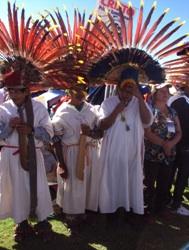Building Solidarity through our Learning Exchange Grants
With the support of Grassroots International, the Mexican Alliance for the Self-Determination of Peoples (AMAP) sent a small delegation of Indigenous representatives to the Peoples World Conference on Climate Change, held in Cochabamba, Bolivia from April 19-22, 2010. Below is an excerpt from AMAP’s report from the event:
“Dear compañeros and compañeras of Grassroots:
Thank you in advance for the trust you have placed in us to represent our native peoples of Mexico, giving us the opportunity to learn about the experiences from other parts of the world, reminding us that we are not alone in this struggle. It is clear that the people in power built this economic system based on war, the exploitation of nature, death and the extermination of Indigenous peoples. We can now understand why the Mexican government does not endorse the San Andrés Agreement and why it has refused to respect Article 169 of the International Labor Organization that guarantees indigenous peoples’ territorial rights. On the other hand, we find that many indigenous communities around the world are resisting the onslaught of transnational corporations that want to seize the resources and knowledge that the native peoples of America and the world have kept for many centuries.”
The AMAP delegation included Maribel Cervantes Cruz from the Women’s Network for a United Earth, Future and a Better World; Elvia Contreras Espinosa from Center for Community Support (CACTUS); and Juan Garrido Cayetano from the Union of Indigenous Communities of the Northern Zone of the Isthmus (UCIZONI).

Each year, Grassroots awards travel grants to our partners and allies to participate in similar learning exchanges. These gatherings support movement building and leadership development among rural families. In Bolivia, Maribel, Elvia and Juan reflected on their own challenges as they took note of others’ experiences. The testimonies from the Mexican delegation touched upon major policy debates in the United States, such as the connection between climate change, immigration and our consumption patterns.
“We often think that climate change is not a problem or concern at the local, regional, or state level. But we see the effects it has caused in the towns and communities in our country and communities worldwide. Floods, fires, tsunamis, hurricanes, pollution at sea and on land, abrupt climate changes, droughts—all these phenomena directly affect the world’s poorest communities. These natural events have destroyed our homes, our means of survival and forced many of our brothers and sisters to emigrate from their homelands to seek refuge in other regions or even in other developed countries. While there, they suffer abuse and humiliation simply because they are foreigners. Migrant workers are the ones who suffer most. 75% of greenhouse gases in the world come from developed countries and their irrationally conceived industries. This is a major paradox – the regions most responsible [for climate change] suffer the fewest consequences.”
International conferences such as The Peoples World Conference on Climate Change and the U.S Social Forum (held this June in Detroit) are important spaces for alternative policy design. Such gatherings provide a space where knowledge is seen as a common good and those most affected by global problems are empowered to lead the way toward real solutions. For our partners, such conferences provide opportunities to learn from others’ experiences and struggles, share in the analysis of the problems their communities face, build relationships, and align themselves with the international community to strategize ways to accomplish their major goal: Save the earth.

In Cochabamba, Maribell, Elvia and Juan met other people who were facing similar challenges because of climate change. By drawing on that common connection, they explored the deeper meaning of solidarity.
“This trip allowed us to generate new contacts. We are sure that AMAP and each of the participant organizations will continue on this road with more strength, and that it will nourish future bold actions. Most importantly, this trip was for us an experience that strengthened and identified us as human beings who feel and think like many of our comrades of the five continents of the world who share our insights from the different areas of intervention. Just as gratifying are the close ties of friendship that will enable us to nurture and exchange knowledge with representatives of each organization and aboriginal people.”
The results of the People’s World Conference on Climate Change will be presented at the United Nations’ Conference of the Parties (COP 16), to be held in December 2010 in Cancun, Mexico. Based upon lessons learned during COP 15, social movements in Bolivia demanded a firm stand from the United Nations on climate issues in Mexico; otherwise they will “take matters into their own hands and form a new organization of nations.”

Frequently, we are asked how we measure the success of these movement-building processes. Movement building cannot often be quantified, as it generates multi-dimensional and long term effects that are hard to measure. Our learning exchange grants are good examples of how challenging it is to say what the impact of our work would be in 10, 20, or 30 years.
One could say that The People’s World Conference on Climate Change and the Defense of Mother Earth itself created a rippling effect at the global scale, and that same affect will impact our partners at AMAP. It reenergized the groups that have tirelessly held governments and corporations accountable for the bad development policies that have generated the climate crisis in the first place. Via Campesina International and its allies, for instance, have called for an overall change in the production-trade-consumption system. “Change the system, not the climate” read the communiqué of social movements and progressive organizations. Itelvina Masioli of Via Campesina succinctly recapped what peasants and indigenous intended by participating in the Conference on Climate:
“We assume the construction of another project: the project of life. A project based on principles that defend life, the Mother Earth, and that is based on another model of social, economic, political and cultural development.”
